#some brief shade at KV as well
Photo
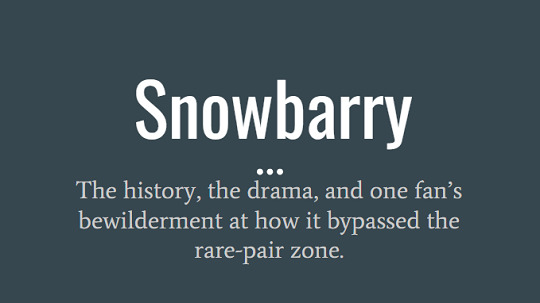
A couple years ago, my family and friends had a PowerPoint party where everyone put together a presentation and delivered it before the rest of the group. Mine was on Snowbarry and the fandom drama wrapped up in it, and though I initially wasn’t going to let it see the light of day on the Internet, because I didn’t want a bunch of angry shippers in my DMs, I’ve decided to go ahead and post it (‘cause tbh the worst luck I’ve had in this fandom has been with fellow Westallen shippers).
Quick disclaimer: I love all of these characters and their canon dynamics with each other, so I’m not bashing any of them here. I’m also not saying that anyone is wrong for liking the idea of Barry and Caitlin as a couple, or that shipping them inherently makes someone a bad person. But I am speaking critically about both the ship itself and a good chunk of its fandom (see: reading them for filth), and some of my points will be fact-based and some will be opinion-based. I myself do not ship Snowbarry, and that fact is made very obvious in this post, so bear that in mind if you wish to continue reading.
Also, the images are not sized to Tumblr’s dimensions, so I recommend clicking/tapping to see them more clearly.
As an additional side note, I made this presentation before the major Killer Frost retcon, so Frost is referenced as a part of Caitlin and not as a full-fledged individual separate from her. I’m also disregarding the last two seasons entirely because 8 was trash and I didn’t even bother with 9.
Now on to the presentation.
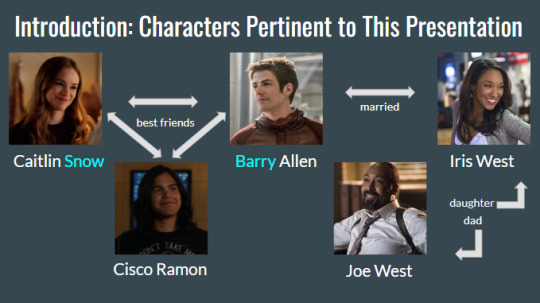
Just what is Snowbarry, you may ask? Snowbarry is the ship name for Caitlin Snow and Barry Allen, two characters from The Flash, usually shipped in opposition to Westallen (Barry Allen and Iris West), which is the main couple in Flash canon.
If you are not familiar with the characters on this show, take a moment to look at the chart above. Pretty self-explanatory. Got everyone’s names and relationship to each other? Good.
Moving on.
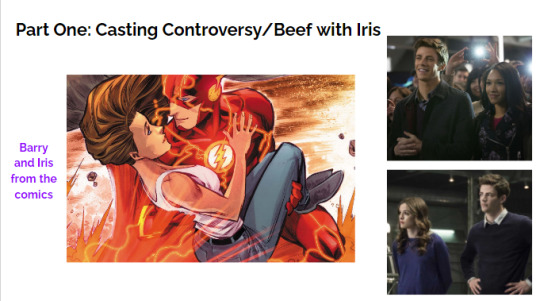
So right off the bat, let’s get into how this ship got its start. Barry Allen is, of course, a comic book character first, and it was already canon in the comics that the love of his life was Iris West, so naturally it followed that she would be the person he’d end up with in the TV adaptation. One noticeable difference between the Iris from the comics and the Iris from the TV show is that Iris in the comics was drawn as a white woman, and Iris in the TV show is played by Candice Patton, a black woman. This caused a big stir among Flash fans before the show even aired, because the TV version of Iris “isn’t comic accurate”.
Neither is Barry, a hunky blond man, now being portrayed by brown-haired beanpole, Grant Gustin, but that detail didn’t get nearly as much or nearly as dramatic of backlash. Most fans are very pleased with Grant’s portrayal of Barry, and some even think he should play him in the DC movie universe. But Candice’s casting was received with an inordinate amount of vitriol, with many fans going so far as to bombard Candice with death threats and other forms of harassment, and people began calling for Caitlin to be Barry’s main love interest since before the first episode even aired.
It’s worth mentioning that Caitlin wasn’t even a Flash character before the TV series; she’s a character from the Firestorm comics who was brought in for this adaptation specifically, so there was no basis to say that she would be a better fit for Barry when there was no preexisting relationship between them in the comics universe. (Comic accurate whom?)
So basically, Snowbarry as a romantic ship was born out of racism, if you didn’t pick up on that already. They became a popular ship, even among people who had liked Iris in the comics, and had their own ship name before anyone had even seen them share screen time. All because they didn’t want to see Barry in love with a black woman.
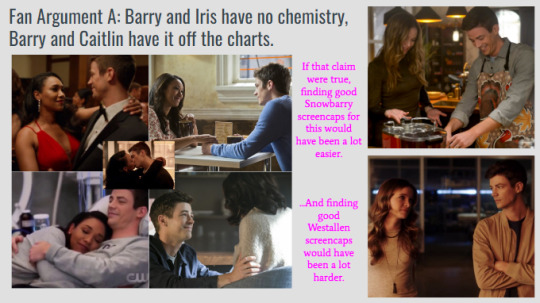
Now that you know how the ship originated, let’s take a look at some fan arguments for how it maintained its popularity after the show started airing. While there are some Snowbarry shippers out there who will state outright that they don’t like Iris because she’s black, most of them have the sense to not want to be thought of as racist, and have defenses for why they prefer Snowbarry to Westallen.
I have encountered a handful of Snowbarry shippers whose claims are genuine, and who even like Iris/Westallen, or even ship all three of them as a polycule. The majority of Snowbarry fans, though, dislike (if not outright hate) Iris, and claim that their reason for preferring Snowbarry is simply that it’s a better relationship, and/or that Caitlin is simply a better character.
A common argument in defense of this preference is that Barry has more chemistry with Caitlin than he has with Iris. I’ve often heard it said that chemistry is subjective, but it’s hard to believe that Barry and Caitlin have such great chemistry--or even that the people who say they do feel it with conviction--when the Snowbarry fandom relies so heavily on photoshop.
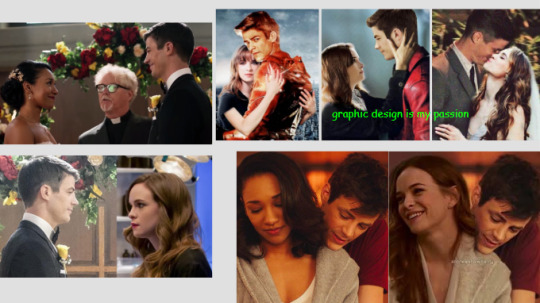
If Barry and Caitlin had such outstanding chemistry, it would show in their scenes together, and it would be easier to find un-manipulated images of them looking like a couple.
Furthermore, if Barry and Iris had such poor (or nonexistent) chemistry, slapping Caitlin’s image over Iris’s wouldn’t make it look like Barry was in love with her. If Barry and Iris were so lacking in chemistry, their scenes together would not be a desirable template to make Snowbarry manips out of.
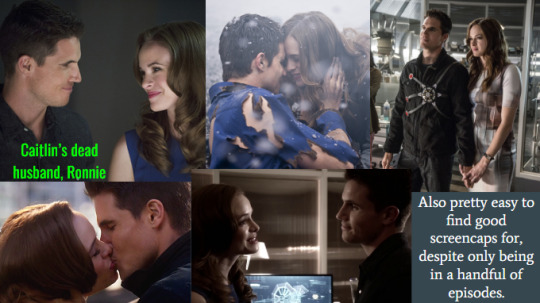
As a bonus, here’s some shots of Caitlin with her main canon love interest, Ronnie. Ronnie is absent for the majority of season 1, and dead for the entire rest of the series, but he is hands-down the person Caitlin has the biggest case of heart-eyes for, as well as the person she has the most passionate kisses with.
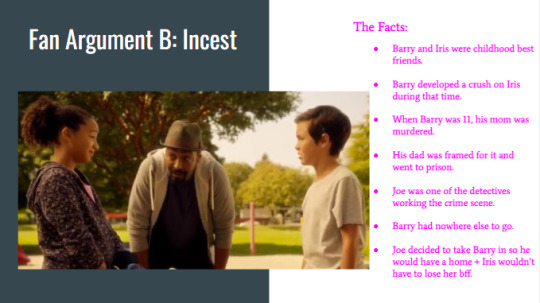
On to the next pro-Snowbarry/anti-Westallen argument, which is that Barry and Iris’s relationship is incestuous. Because as is the age-old fandom philosophy, if you don’t have a good reason to take the moral high ground, make one up.
Do Barry and Iris share DNA? No. This alone makes their relationship non-incestuous, but even when you get into the particulars, their getting together is still...not weird or bad at all.
Did Barry and Iris grow up in the same house? Yes. Starting at age eleven. At which point they already knew each other as friends, and Barry had already developed a crush on her, and then had to deal with moving in with the girl he liked. Because he had no choice.
Are Barry and Iris legally siblings? Technically unconfirmed, but most likely no. Iris does refer to them as “kind of like brother and sister” in the pilot episode, but in the same sentence, she also says the words, “we’re not brother and sister”. And Joe has been referred to as Barry’s guardian, adoptive father, and (unless I’m mistaken) foster father, and Barry has also affectionately referred to him as simply his father, and called him “dad” once. Exactly what the legal terms of Joe’s custody of Barry in his childhood were is unclear, but it’s safe to say Barry isn’t his son in the full legal sense of the word, considering he still goes by his biological father’s name and he didn’t run into any legal issues in marrying Iris.
Regardless, it’s Barry’s relationship with Iris that should determine whether or not his getting with her romantically is weird, not his relationship with Joe. If seeing Joe as a father figure makes getting with his child incest, then you could argue that any combination of Team Flash getting together would be incest because Joe is practically everyone’s dad at this point.
There are scenarios in which a romantic relationship between two characters in a situation like Barry and Iris’s would be weird and uncomfy, and come off as practically incest even though it wouldn’t be in a literal sense. Adoptive siblings do count as ~real~ siblings, and a romantic relationship between two unrelated individuals who grew up under the same roof can absolutely have some of the same negative ramifications that such a relationship between blood siblings could have. But Barry and Iris simply do not have the kind of sibling-like relationship dynamic that would cause those kinds of issues, so that plus the fact that there’s no biological relation between them makes the incest argument, frankly, stupid.
Sure, everyone has their own comfort level on matters like this; the most believable/relatable sibling relationship on this show is between two characters with no biological or legal ties to each other, and who met in their twenties (more on them later), and it makes me viscerally uncomfortable to see people ship them as a couple because they’re too much like brother and sister. But I consider myself an expert on siblings--I have six of them myself--and that’s not what Barry and Iris are.

Perhaps the most common claim among Westallen antis is that Iris is a bad person, or at least a bad girlfriend, or maybe even straight up abusive. These claims are...incorrect, and once again we delve into outright making stuff up, when simply blowing small matters out of proportion doesn’t do the trick. No one is perfect, and Iris is no exception. That doesn’t make her a terrible person.
As a person, Iris is brave, caring, ambitious, stubborn, loyal, charismatic, honest, assertive, forgiving, jealous, selfless, and protective, among other things. As Barry’s partner, she is very gentle and supportive, and she is often the only person who can get through to him when he’s either being too hard on himself, or being too single-minded and needs someone to talk some sense into him. They don’t fight often, but when they do, their issues are usually resolved fairly quickly with open and civil communication. Iris shares the responsibility of protecting the city with Barry, despite not having any powers of her own, in addition to finding ways to help people outside of official Flash business. She has her faults, but overall she’s a pretty good and well-rounded person.
The one negative claim against her in this matter to have some degree of credibility is that the individual fan simply finds her annoying. Annoying is a subjective term, so I can’t really argue that someone is wrong for being annoyed by someone I find to be very lovable. There have been moments where I was annoyed with Iris, and I think that Iris is the bee’s knees. There have also been moments where I was annoyed with Caitlin. And with Barry. And even Cisco (and I’ll fight anyone who dares call Cisco annoying).
What this argument against Iris basically boils down to is nitpicking over her being human and thus flawed. Well-written characters should be wrong now and then, and even the most lovable person can be annoying on occasion. But when it comes to Iris, first of all, a lot of the criticism for her is non-factual, and often wildly so. But also, even when it comes to valid critiques of her, there’s a tendency to focus on the negative when her positive traits far outweigh them--yet when the same or even worse negative traits are present in another character, they’re often excused or overlooked.
I’m not going to pretend that Iris stans aren’t guilty of doing the same with other characters out of bias for their fave, too (and boy do they), but by and large, Iris is the one who is disproportionately judged unfairly and subjected to double standards by the fandom.
If you’re just a fandom puritan hellbent on liking only the most unproblematic of characters, then technically Caitlin should be the one getting more flack since she has the longer rap sheet between the two, and Iris has one of the strongest moral compasses on the show.
As for personal preference? Of course, it’s totally possible that someone “just thinks she’s annoying”--but the tendency of black characters (or any non-white character for that matter), women, and especially black women being labeled “annoying” regardless of personality is a little too common to be taken at face value, so I’m automatically suspicious of anyone who calls her annoying, and bases their whole opinion of her on that, instead of recognizing her merits (because if you haven’t guessed, it’s not very plausible that that many people genuinely find her annoying as a person with no underlying prejudices at play).

Now, there are some people who started shipping Snowbarry during season 1 (y’know, after actually seeing the characters in action), because there was actually some groundwork laid for it. Not much, but it’s not nonexistent. Barry had a few love interests before ultimately getting with Iris, and a fleeting romance with Caitlin was also considered, before Grant vetoed that idea in favor of prioritizing what he felt was the more interesting and satisfying relationship, i.e. Westallen.
There were a few hinting comparisons drawn between Barry and Ronnie in early episodes, and a few platonic-but-in-a-heteronormative-way interactions between Barry and Caitlin. One episode in particular more overtly teased the idea of a possible attraction between them that they were too hung up on other people to recognize, but nothing ever came of it (partly because that episode also served to introduce one of Barry’s temporary love interests, Linda). And even the more shippable moments in it came across as mostly one-sided, and more as Caitlin trying to get over Ronnie than as being truly interested in Barry (spoiler alert: it didn’t work).
There have also been moments of light fanservice with no depth, such as the two kisses pictured above, which are two moments that the Snowbarry fandom treasures, and points to as validation of their ship.
The first is of someone who is not Barry, Caitlin just thinks he is in the moment. It is actually Hannibal Bates (aka Everyman), a shapeshifter who is causing trouble around town by committing crimes while impersonating innocent people. He kisses Caitlin to distract her while she’s trying to work on something to negate his powers, and Caitlin is confused and weirded out by his advances. And while one could argue that she started to seem a little into her second kiss with him, if she was, it didn’t last. Regardless, she was clearly not feeling the first one, she was relieved when she learned that it hadn’t really been Barry putting the moves on her, and she got uncomfortable and jumpy later when, for a split second, she thought the real Barry was going to try to kiss her again (so romanticizing that situation isn’t concerning at all).
For the second pictured kiss, Caitlin was in the middle of a mental breakdown/being taken over by someone whose actions she was strongly opposed to when she was stable and in control, and she kissed Barry not because of any feelings she might have toward him, but with the intention of freezing him to death with her ice powers--yup, she was actively trying to kill him with that kiss.
So to review, there are two Snowbarry kissing scenes in canon, and both of them are:
nonconsensual
not done with romantic intent
not really between Barry and Caitlin
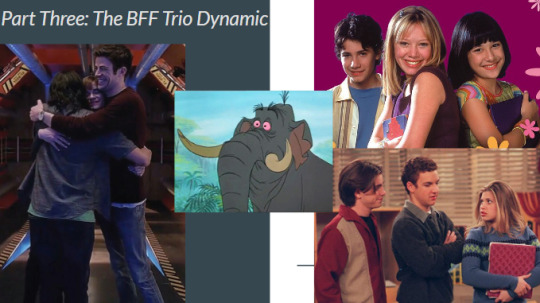
Moving on from the Snowbarry fandom’s perspectives, now it’s time to address the elephant in the room that no Snowbarry stan ever wants to address, and that is the matter of the dynamic of O.G. Team Flash.
As indicated at the beginning of this post, Barry, Caitlin, and Cisco are a best friends trio. This kind of friend group is a common occurrence in both fiction and real life, and in the case of fiction at least, it’s common for there to be a favorite friend (which is almost always the main character).
In the case of the two other trios pictured above, for example, Gordo and Miranda have their own friendship independent of their respective relationships with Lizzie, and Shawn and Topanga similarly have their own friendship independent of their relationships with Cory--but in both cases, each friend has a closer relationship with the protagonist (Lizzie and Cory) than they have with each other.
O.G. Team Flash also has one character who is closer with the other two than they are with each other, and is therefore the favorite friend. And in this case, that friend
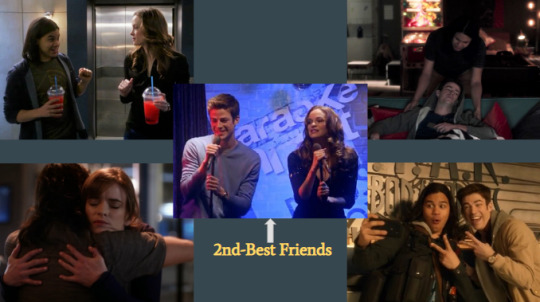
is Cisco. By a landslide, it is Cisco. It’s obvious in the show-don’t-tell sense that he is the friend they each have the closer bond with, whom they are both more likely to turn to for comfort or advice, and whom they would rather hang out one-on-one with, given the choice between him or each other. But it’s also implied in the way they talk about each other.
Cisco has referred to Barry and Caitlin both as his best friend, independently of each other, and it’s a tough call to say whether he’s closer with one or the other.
Barry has referred to Cisco as his best friend (singular) multiple times, with no mention of Caitlin, but in the times he referred to Caitlin as one of his best friends (plural), he did so in a way that was inclusive of Cisco. He has never called just Caitlin his best friend the way he has with Cisco (or with Iris, before they started dating).
Caitlin as far as I can recall has never used that term in regards to her friendship with either guy, but it’s obvious who she’s closer with. For that matter, Cisco is easily the most consistent and most important person in her life, whether she is aware of that fact or not. (At this point in the original presentation, my mom interjected to ask why Cisco and Caitlin weren’t the big fandom ship then, and I explained that they act like siblings and canonically think of each other as such, so most of the fandom doesn’t ship them romantically because That’s Weird, and their canon platonic relationship is something that most everyone values as is.)

I mean, heck, in The Icicle Cometh--an episode widely regarded as a ~Snowbarry episode~ because of the amount of scenes Barry and Caitlin get together in it--Barry all but says outright, “Cisco cares about you more than I do.” (pictured above)
Seriously, what does that line even mean if it’s not an acknowledgement that he does?
Of course, many Snowbarry shippers don’t like the fact that Cisco is the favorite friend because it blows holes in their ship, so they rationalize that closeness by likening Barry and Caitlin to his parents, which is all kinds of wrong and gross and just, no.
Considered but not included for this slide (because it would be hard to fit and would’ve required providing context for a room of people who don’t watch the show) was a screencap of Barry asking Frost, aka Caitlin’s other side, “How do you convince your best friend not to save your life?” while referring specifically to Cisco, just to further emphasize my point.
And speaking of Barry and Cisco,
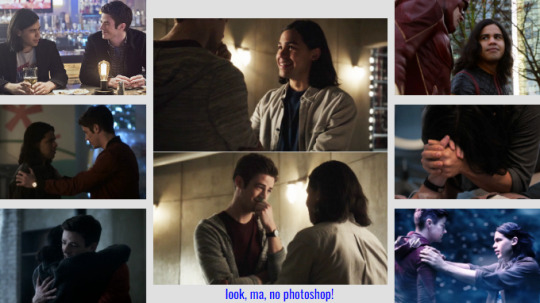
I could do a whole PowerPoint presentation dedicated to why they would be better and more sense as a couple than Barry and Caitlin!
(And for the next PowerPoint party I kind of did, plus I’ve made a few other posts related to this subject.)
It just doesn’t make sense to me to make such a big fuss over two people who are clearly each other’s second-favorite friend. Personally, I’d be a little embarrassed to be shouting from the rooftops about how much better Snowbarry is than Westallen, and how Caitlin is the person Barry really loves and should end up with, when they don’t even like each other as much as they like Cisco.
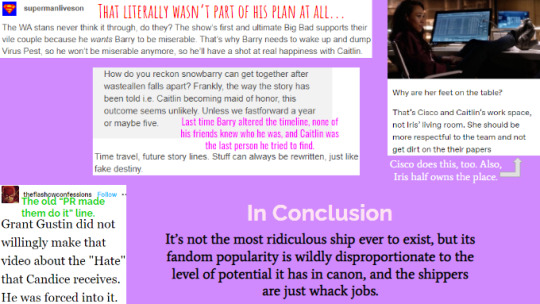
And for my final slide, here’s some screenshots of Snowbarry fans being awful and unhinged + my commentary on them.
It’s not that Snowbarry is an inherently bad ship or entirely baseless--no more so than many of the other fanon ships for this show--but the fact that it’s as mainstream as it is when it has such little canon support and such weak arguments in favor of it reeks of racism, with a dash of hetero-/amatonormativity. The most sincere and non-toxic Snowbarry shippers I’ve seen around tend to be multishippers and/or rare-pair fans, which is where I see Snowbarry as a romantic ship making the most sense. But for such a large number of people to be adamant that the show should change its trajectory to make Caitlin the love of Barry’s life instead of Iris? That’s just bullshit.
#the written version will probably take longer to get through than the version I presented live#anti snowbarry#anti snowbarry fandom#some brief shade at KV as well#The Flash
10 notes
·
View notes
Text
The Carnivalesque and Redemption for Marginalized Members of Society
A Scene Analysis of I am Legend - Alyssa E. Logie

Francis Lawrence’s film I am Legend (2007) portrays Mikhail Bakhtin’s notion of the carnivalesque, as marginalized members of society are given temporary power and agency during the near-apocalypse caused by the Krippin Virus outbreak. This paper will closely analyze a sequence from the ending of the film that effectively encapsulates Bakhtin’s notion of the carnivalesque, portraying the short-lived inversion of social hierarchy, the return to hegemonic normalcy, as well as hope for the “distant possibility” of permanent future change to the social hierarchy (Bruce 5).
Mikhail Bakhtin coined the term “carnivalesque” to describe social relations that occurred during “carnival celebrations in medieval Europe” (Bruce 5). The carnival is a “limited time period” in which the social hierarchy is “turned upside down”; people who are normally at the bottom of the social hierarchy have a brief period of time in which they can be granted power over people who are normally situated at the top of the social hierarchy (5). Such temporary inversions of the social hierarchy are “transgressive, but contained: the hegemony sanctioned these festivals, and their power was never truly disrupted or overturned” (5). While the carnivalesque does not lead to any “social reform”, it does suggest that “at some point in the future, things could change” (Bruce 5).
Bakhtin’s notion of the carnivalesque can be applied to the film I am Legend. The protagonist, Robert Neville (Will Smith) is a black virologist who resides in the ruins of New York City, where most of the population has either been killed or turned into blood-hungry zombies by a cancer cure gone wrong—the Krippin Virus (KV). People of colour are usually placed at the bottom of the social hierarchy underneath white members of society, the police force and military power. Neville has temporary power and agency during this time of unusual circumstances because New York City has become a location free of police or military power, and KV has created a zombie ‘other’ that temporarily takes the place at the bottom of social hierarchy. These unusual circumstances allow other previously marginalized people, such as people of colour, women and children, to have “temporary power over people who are normally situated at the top of the social hierarchy (Bruce 5).

Figure 1: Destruction of normalcy
A sequence at the ending of the film portraying Neville’s final struggle to combat the zombies (1:24:25—1:31:55) articulates Bakhtin’s concept quite well. At the beginning of the sequence, a zombie is tearing away at the roof of Neville’s home (Figure 1). The home is typically seen as a symbol of stability within western culture. The zombie is symbolically destructing the state of normalcy and stability, rendering this situation as a carnivalesque period of time. After Neville kills the zombie and frees Anna (Alice Braga) and her son—who are typically marginalized members of society as a woman and child of colour— he peers through a slot in a window to see a large group of zombies heading towards the home. The slot frames Neville’s reaction to the horrific scene outside, emphasizing how this is an unordinary and carnivalesque situation for Neville to be witnessing (Figure 2). The zombies climb the walls of the home and then brutally enter the safe space, signifying a time of complete chaos and the inversion of normalcy. When the safety of the home has been destroyed, Neville, Anna and her son must flee to the basement lab where they become contained within a small glass room. Once inside the glass room, Anna notices that a serum Neville created is successfully returning a sedated zombie back to normal: the zombie’s skin is returning to a normal shade of white (Figure 3). Neville has found the cure for KV, but with this breakthrough he also is putting an end to his temporary positon of power; white privilege is symbolically being restored directly in front of him.

Figure 2: Witnessing the carnivalesque

Figure 3: Return to whiteness, beginning of the end of the carnivalesque
The zombies violently propel themselves against the glass doors and the glass slowly shatters, symbolizing the inevitable breakdown and fragility of Neville and Anna’s temporary position of power. Neville tries to stop the zombies, “You are sick and I can help you!” he pleads, but the zombies disregard his cries and continue to smash the glass. As a person of colour, Neville is not capable of stopping the zombies himself. Suddenly, Neville notices that the smashed glass resembles a butterfly and he is reminded of the words of his late daughter Marley, “Look, Daddy! A Butterfly”. These words of a black female child—the ultimate marginalized member of society—as well as the butterfly tattoo on Anna’s neck, remind Neville of his actual place at bottom of the social hierarchy, and that his time of power is limited. He can be the one to discover the cure, but he will not have the social power as a black man to implement it. Neville realizes the cure is in the zombie’s blood”—whiteness will return the social order back to normal, ending the carnivalesque state. Neville ushers Anna and her son into an even smaller contained space, symbolizing how their power is being reduced even more, and then blows himself up to kill the invading zombies. Neville’s temporary position of power has come to an end; he kills himself because he knows he cannot retain this power when normalcy is put back into place by the cure. The only thing he can do is sacrifice himself so that Anna can give the serum to a member of society with higher power than them so that it can be utilized.

Figure 4: Return to normalcy and the hegemonic social hierarchy
At the end of the sequence, Anna and her son arrive at the gates of a new community. Anna hands the vile of zombie blood over to a military officer, symbolizing how she can be the transmitter of the cure, but she does not have the power to implement it. Marginalized members of society must return to their place within the normal hegemonic social hierarchy (Figure 4). This scene highlights how the carnivalesque allows for a short-lived liberation for the “subject oppressed through ideological conventions” through which a “distant possibility of change” is presented, but “never close enough to become the object of a thoroughgoing examination” (Matthews 27-30). However, I am Legend does express the possibility of permanent alterations to the social hierarchy, as the film ends with Bob Marley’s “Redemption Song”, the last song on Marley’s final album before he died. The song is the story of a black man who has been persecuted by society, but knows he will seek redemption one day through the collective action of fellow oppressed members of society. It is no coincidence that Neville’s daughter is named Marley: she represents a marginalized member of society who must rise up to invert the social hierarchy permanently. It is also important to note that the military officers who welcome Anna into the new community are men of colour (Figure 5). This detail suggests that although social reform has not happened yet, there is still hope for the future. The military is still positioned at the top of the social hierarchy, but at least people of colour can hold these positons of power. In this way, I am Legend provides a progressive image for marginalized members of society through the implication of a carnivalesque situation and the proposed potential for permanent social reform.

Figure 5: Hope for permanent social reform
Works Cited
Bruce, Barbara. “Shaun of the Dead.” Owl Lecture, 2012. Web.
I am Legend. Dir. Francis Lawrence, Warner Bros. Pictures, 2007. Film.
Matthews, Nicole. “Is Parody Political?” Comic Politics: Gender in Hollywood Comedy After the New Right. Manchester, UK: Manchester UP, 2000. 12-50. Print.
#I am Legend#Will Smith#Zombies#Zombie Film#Carnivalesque#Film Analysis#Film Studies#POC#Marginalized#Power of Cinema#Redemption#Bob Marley#Reform
0 notes